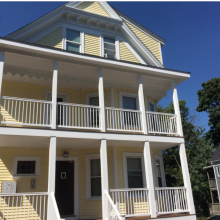What We Do
When each family arrives at Hildebrand, they find resources, services, and programming to support them throughout their journey to transition out of homelessness. Each family’s situation is unique, and Hildebrand staff work together with every family to build on their strengths and leverage resources to find stability and a permanent home.

Emergency Shelter
Hildebrand operates 157 emergency shelter units across Boston and Cambridge, which include congregate and co-shelter living programs as well as scattered-site apartments. Families experiencing homelessness are referred to Hildebrand through Massachusetts’ Executive Office of Housing and Livable Communities (EOHLC). Within their first week of shelter stay, families work together with Hildebrand staff to create a rehousing plan that leverages the family’s individual strengths and assets towards securing permanent, affordable housing.

Supportive Services
Hildebrand provides comprehensive, culturally-responsive case management and supportive services in a variety of languages to all families in shelter. We work closely with each family to find, apply for, and move into safe, affordable permanent homes. Hildebrand staff also connect families with support and resources related to education, employment, health, clothing, food, and more.

Permanent Housing
Hildebrand operates 31 units of permanent housing across Boston and Cambridge, including nine units of permanent supportive housing for families who are exiting chronic homelessness. The Permanent Supportive Housing Program, funded through the Boston Continuum of Care, offers an affordable permanent home with on-site supportive services for families who face the most significant barriers to securing safe, stable housing.

Stabilization Services
Hildebrand continues working with families for at least two years post-shelter to support families in remaining stably housed. Over the course of the two years, families and Stabilization Services Case Managers work together to develop plans to increase economic mobility and work towards their goals. This program is proven to be effective: after two years, 95% of the families in the Stabilization Services Program stay securely housed.
Do you want to help support Hildebrand?
Contact
614 Massachusetts Avenue
Third Floor
Cambridge, MA 02139
Ph: 617-491-5752
F: 617-491-2385
